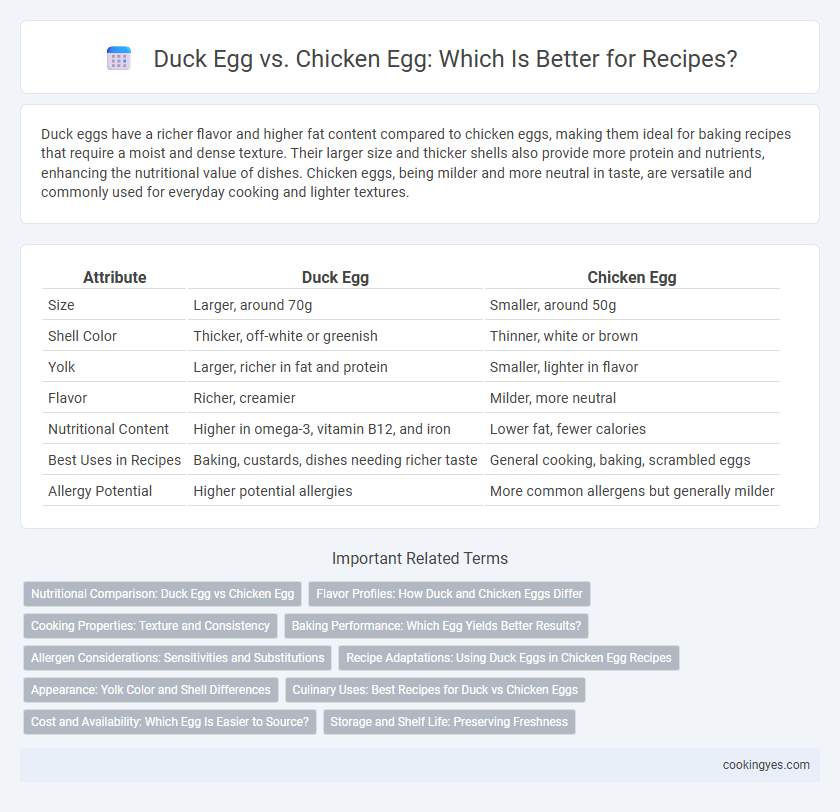Duck eggs have a richer flavor and higher fat content compared to chicken eggs, making them ideal for baking recipes that require a moist and dense texture. Their larger size and thicker shells also provide more protein and nutrients, enhancing the nutritional value of dishes. Chicken eggs, being milder and more neutral in taste, are versatile and commonly used for everyday cooking and lighter textures.
Table of Comparison
| Attribute | Duck Egg | Chicken Egg |
|---|---|---|
| Size | Larger, around 70g | Smaller, around 50g |
| Shell Color | Thicker, off-white or greenish | Thinner, white or brown |
| Yolk | Larger, richer in fat and protein | Smaller, lighter in flavor |
| Flavor | Richer, creamier | Milder, more neutral |
| Nutritional Content | Higher in omega-3, vitamin B12, and iron | Lower fat, fewer calories |
| Best Uses in Recipes | Baking, custards, dishes needing richer taste | General cooking, baking, scrambled eggs |
| Allergy Potential | Higher potential allergies | More common allergens but generally milder |
Nutritional Comparison: Duck Egg vs Chicken Egg
Duck eggs contain higher amounts of protein, fat, and vitamins such as B12 and D compared to chicken eggs, making them more nutrient-dense for recipes requiring rich flavor and texture. The larger yolk-to-white ratio in duck eggs enhances creaminess and moisture in baked goods and custards. While chicken eggs offer slightly fewer calories and less fat, they provide a milder taste and are more commonly used in everyday cooking.
Flavor Profiles: How Duck and Chicken Eggs Differ
Duck eggs exhibit a richer, creamier flavor and a higher fat content compared to chicken eggs, resulting in more intense taste and a denser texture in recipes. Chicken eggs have a milder, more neutral flavor that blends easily into a wide variety of dishes without overpowering other ingredients. The distinct flavor profile of duck eggs enhances baked goods and custards, delivering a richer mouthfeel and deeper taste complexity.
Cooking Properties: Texture and Consistency
Duck eggs have a richer texture and thicker consistency compared to chicken eggs, making them ideal for recipes requiring dense and moist outcomes such as custards and baked goods. Their higher fat content contributes to a creamier mouthfeel and enhances the structure of cakes and pastries. In contrast, chicken eggs offer a lighter texture and more delicate consistency, suitable for airy dishes like meringues and souffles.
Baking Performance: Which Egg Yields Better Results?
Duck eggs have a higher fat content and richer protein structure compared to chicken eggs, resulting in denser, moister baked goods with a more tender crumb. Their larger size and thicker shells contribute to better emulsification and volume in batters, enhancing texture and rise in cakes and pastries. Chicken eggs provide a lighter, fluffier consistency, making them preferable for delicate meringues and sponge cakes.
Allergen Considerations: Sensitivities and Substitutions
Duck eggs contain higher levels of protein and different types of albumin compared to chicken eggs, which can trigger stronger allergic reactions in sensitive individuals. When substituting duck eggs for chicken eggs in recipes, it's important to note that some people with chicken egg allergies might tolerate duck eggs, but cross-reactivity can occur. Always test for specific allergen sensitivities before making substitutions and consider using hypoallergenic egg alternatives like aquafaba or commercial egg replacers for safer options.
Recipe Adaptations: Using Duck Eggs in Chicken Egg Recipes
Duck eggs have a higher fat content and larger yolk than chicken eggs, making them ideal for richer, moister baked goods when substituted. When adapting chicken egg recipes, reduce the number of duck eggs slightly or adjust baking times to avoid overly dense textures. Their stronger flavor and thicker shells can enhance custards, cakes, and bread, yielding superior taste and texture in comparison to chicken eggs.
Appearance: Yolk Color and Shell Differences
Duck eggs have a richer, more vibrant orange yolk compared to the paler yellow yolks of chicken eggs, which enhances the visual appeal of baked goods and custards. The shell of a duck egg is thicker and often has a bluish or greenish tint, while chicken eggs typically feature a thinner shell in shades of white or brown. These differences in yolk color and shell robustness can affect recipe presentation and handling, especially in delicate desserts.
Culinary Uses: Best Recipes for Duck vs Chicken Eggs
Duck eggs have a richer flavor and higher fat content, making them ideal for baking recipes like custards, cakes, and pastries that benefit from extra moisture and texture. Chicken eggs are versatile and commonly used in everyday cooking, perfect for omelets, scrambled eggs, and lighter baked goods. Recipes requiring a delicate balance, such as souffles or meringues, often favor chicken eggs for their cleaner taste and stable whites.
Cost and Availability: Which Egg Is Easier to Source?
Chicken eggs are generally more cost-effective and widely available in most supermarkets, making them a more accessible choice for everyday recipes. Duck eggs tend to be pricier and less common, often found in specialty stores or farmers' markets, which can limit sourcing options. For budget-conscious cooking and consistent supply, chicken eggs provide a reliable base ingredient.
Storage and Shelf Life: Preserving Freshness
Duck eggs have a thicker shell and higher fat content, which extends their shelf life up to 4-6 weeks when refrigerated, compared to chicken eggs that typically last 3-5 weeks. Proper storage in a cool, consistent temperature environment and keeping eggs in their cartons prevents moisture loss and preserves freshness. For recipes requiring longer-term storage, duck eggs offer greater durability and maintain their quality better than chicken eggs.
Duck egg vs Chicken egg for recipe base Infographic

 cookingyes.com
cookingyes.com